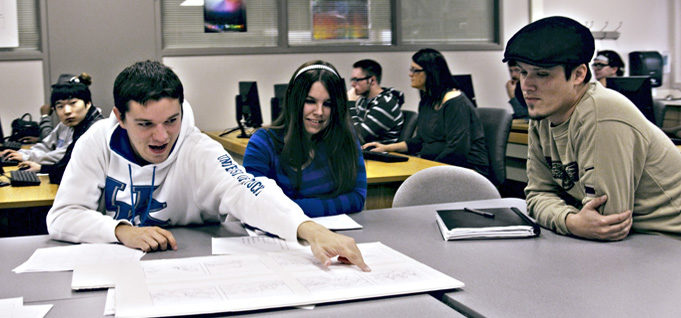Re-inventing the first-year experience
By Sanci Teague, David Heflin and Tyra Henderson
October 12, 2016
West Kentucky Community and Technical College takes a proactive approach to ensuring students succeed their first year in college.
West Kentucky Community and Technical College (WKCTC) serves a population of students who often struggle to understand the expectations of college and how to reach the educational goal of earning a college credential.
Recognizing the continued needs of its student population, WKCTC embarked on a project in 2014 to help students find their paths at the college through a research-supported practice.
Beginning with the end in mind
For many years prior to 2014, WKCTC offered a first semester course called GEN 102— Foundations of Learning. This course served as a bandage and was designed to address just-in-time remediation and study skills students had proven they lacked through previous course work. Students who had failed multiple courses, held low cumulative GPAs or tested strictly into developmental course work were strongly encouraged to take the GEN 102 course.
Twice a week, students would review study strategies and brush up on general reading and writing skills. For many students, the problem with this “first semester” course approach was that it presented important skills after the students had already failed first semester courses. The second semester placement of GEN 102 did little to motivate students to actively engage in pursuing their academic and career goals or improve upon their academic skills. GEN 102 was a reactive approach to addressing the students’ needs.
Through a self-study process that began in 2011, WKCTC sought improvements for students in their first year. This included engaging with faculty and staff, reviewing WKCTC data, exploring available studies, and having open and honest discussions. WKCTC concluded to take a more proactive approach to addressing students’ needs in the first semester.
As part of the Kentucky Community and Technical College System (KCTCS), WKCTC worked through the process of developing a first-year experience course with other colleges, a course identified as a high-impact educational practice. This work created the FYE 105 – Achieving Academic Success course. FYE 105 is designed to provide supports and information to guide students toward better understanding of the college environment and the skill sets and behaviors necessary for academic success as well as advise them toward a path of completion.
WKCTC first offered FYE 105 as an optional course for first-year students in fall 2014. Findings from that first semester reflected increased persistence and cumulative GPAs for students who took the course compared to those who did not. WKCTC decided to develop a policy that
mandated all newly enrolled students to take FYE 105 in the first semester. However, this required buy-in from those involved in the 2011 self-study process as well as stakeholders across campus. There were plenty of discussions, primarily in division and leadership meetings, to share FYE 105’s first-year data and to understand how widening the reach of FYE 105 could affect various programs. Consensus was one method of offering FYE 105 would not fit the needs of all students.
The college then began working with each division to find a format of the course that would work for their students. These additional conversations helped to mold FYE 105 into specific sections, allowing for clear demarcation of concepts and outcomes for the course. For example, the FYE 105 course objectives and outline were divided into three one-credit-hour modules: FYE 1051, FYE 1052 and FYE 1053.
Where applicable, WKCTC programs would offer one of these modules that pertained specifically to their group of students, instead of the full three credit-hour-course. In two cases, faculty found similarities in their individual program’s course offering for first-year students. These varied incarnations of FYE 105 allowed faculty and staff to see how the first-year experience course fit within their particular areas, aligning with their own courses and program outcomes.
Beginning this fall 2016, WKCTC is serving more than 700 students with their multiple offerings of FYE 105. The college again will dig into this data for a deeper understanding of FYE 105’s impact on persistence, student-support strategies and completion.
Read about more student supports offered by WKCTC in the full article in Community College Daily.
Continue the conversation on our LinkedIn group.





